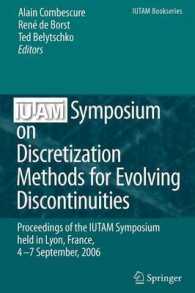Full Description
This year's guide shows how much the collective and group action market has developed over recent years. This year has seen some important developments in what is now a much more mature market than 10, or even five, years ago. Changes in legislation and regulation in the United Kingdom and the European Union are creating opportunities to pursue group claims, or to regulate how they can proceed. Governments can call for evidence based on track record to make assessments and decisions that affect the market. This year's review considers the implications of some of these steps.
Each year we comment on the growth of class and collective action litigation, and this year is no exception. Collective actions are now seen as part of the business landscape in the United Kingdom and, increasingly, in Europe. There is also much greater press and media interest and coverage of the actions, and the events that have given rise to them.
Third-party litigation funding continues to underpin (and often drive) the rise in collective actions. These actions can often take years to resolve, and funders are increasingly receiving returns from collective action proceedings. In the United Kingdom, funders are increasing their investments in various types of cases, which include competition, securities litigation, labour and employment, environmental and data privacy. Cases in all these areas are now assessed against a background of increased knowledge about the legal and procedural issues that determine their likely success. The report of the UK Civil Justice Council dated 2 June 2025 into third-party litigation funding is generally seen by the market as being likely to create additional opportunities for litigation funders, albeit in a more transparent environment.
Consideration continues to be given to how consumers can best participate in and benefit from collective actions. On 7 April 2025, new legislation entered into force in the United Kingdom in the form of the Digital Markets, Competition and Consumers Act 2024, which is expected to usher in a new era of consumer law enforcement. The
UK Government's Call for Evidence on 6 August 2025 will lead to further examination of how competition claims can be pursued. The EU's Representative Actions Directive continues to be implemented across Member States. This focus on consumer protection and redress seems destined to continue.
The overall perception of the role of private sector collective actions being harnessed to support public sector objectives is increasing. This change in perception can be seen in various ways, including a rise in claims of specific types (such as actions following high-profile data privacy breaches), and increased media attention in respect of
other claims (such as high-profile competition actions against water companies and gaming console manufacturers). Public concern about environmental issues (and a perception of governments failing to do enough to tackle climate change) has also generated increased interest in environmental class actions.
A key driver of the expansion in activity over recent years has been attempts by claimant groups (supported by increasingly experienced law firms, litigation funders and other service providers) to test the boundaries of the procedural routes by which collective actions can be pursued. Similar developments have occurred in the last 12 months. From a procedural perspective, key judgments have been issued that are likely to shape the future of the collective actions landscape, providing "blueprints" that offer guidance to key market participants (including law firms, funders and prospective claimants) on the likely demands of pursuing collective actions.
All of these areas merit close scrutiny and are considered in some detail. Overall, the more developed and mature marketplace is seemingly destined for further expansion, supported in many cases by governmental and regulatory developments. Businesses and practitioners will do well to review future developments as this seemingly inexorable
growth continues.
Contents
Expert Analysis Chapters
1
In Case of Any Doubt - The Group and Collective Action Market is Here to Stay
Louise Skinner, Alexandre Bailly, Leonidas Theodosiou & Keir Baker, Morgan Lewis
8
Developments and Trends in Collective Actions
Lawson Caisley, Stephanie Stocker, Sonja Hoffmann & Katherine Godar, White & Case LLP
19
Environmental Trends in Consumer Protection Litigation: From Pollution to Premium
Ceren Canal Aruoba, Dr. Robin Cantor, Dr. Kristina Shampanier & Dr. Gina Waterfield, BRG
25
The Evolving Landscape of UK Securities Class Actions
Andrew Herring & Emilie Jones, Pinsent Masons LLP
31
Mass Actions to Protect Individual Rights in the New AI Economy
Michael Boelter, Ryan J. Clarkson, Timothy Giordano & Tiara Avaness, Clarkson Law Firm
39
Economic Expert Evidence Under the Microscope: Lessons From the UK Courts
Camelia O'Brien & Francesco Bilotta, AlixPartners
Q&A Chapters
46
Austria
Stephan Kugler & Simon Fiala, Wolf Theiss
54
Canada
Matthew Angelus, Sarah E. Whitmore, Alexandra Lawrence & Marie-Ève Gingras, Torys LLP
64
Czech Republic
Jan Šturm, Adam Forst, Petra Joanna Pipková & David Krejčí, HAVEL & PARTNERS
74
Denmark
Safinaz Altintas Karaca & Heidi Bloch, Kennedys
83
France
Jérémy Bernard, CPC & Associés
95
Germany
Dr. Martin Eimer, Katrin Ruhl, Dr. Nicolas Nohlen & Dr. Katrin Hansen, Ashurst LLP
109
Ireland
Peter Johnston & Finnian O'Neill, Mason Hayes & Curran LLP
116
Israel
Shir Eshkol, Eshkol
124
Netherlands
Damiën Berkhout, Noor Hogerzeil & Dizzy van Duijn, Lindenbaum
133
New Zealand
Fionnghuala Cuncannon & Kate Muirhead, Cuncannon
142
Sweden
Krister Azelius, Lotta Knapp Lönroth, Olivia Sandin & Cornelia Edefell, Azelius & Partners Advokataktiebolag
149
United Kingdom
Emilie Jones, David Barker, Jacqueline Harris & Laura Gillespie, Pinsent Masons LLP
160
USA
Scott Schutte, Morgan Lewis






